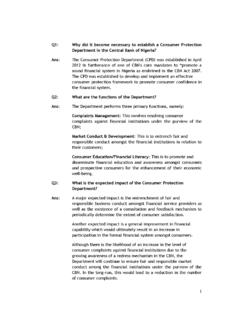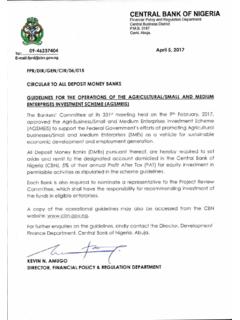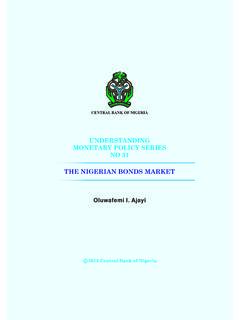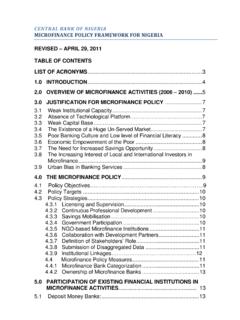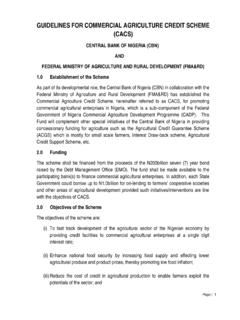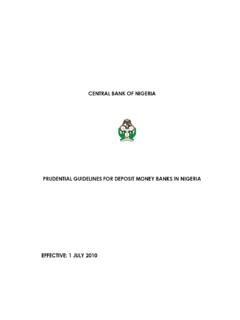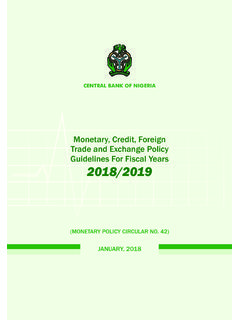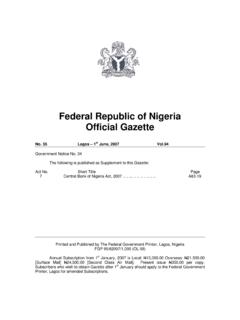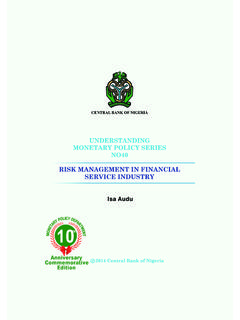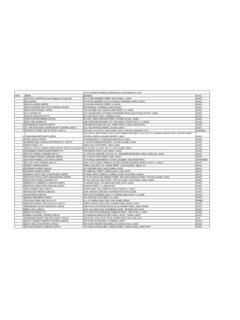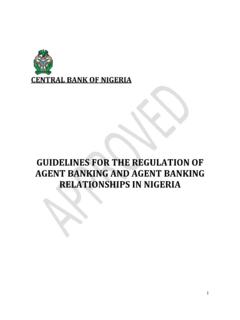Transcription of Q1 Why did it become necessary to establish a Consumer ...
1 1 Q1: Why did it become necessary to establish a Consumer protection department in the central bank of nigeria ? Ans: The Consumer protection department (CPD) was established in April 2012 in furtherance of one of CBN's core mandates to promote a sound financial system in nigeria as enshrined in the CBN Act 2007. The CPD was established to develop and implement an effective Consumer protection framework to promote Consumer confidence in the financial system. Q2: What are the functions of the department ? Ans: The department performs three primary functions, namely: Complaints Management: This involves resolving Consumer complaints against financial institutions under the purview of the CBN; Market Conduct & Development: This is to entrench fair and responsible conduct amongst the financial institutions in relation to their customers; Consumer Education/Financial Literacy: This is to promote and disseminate financial education and awareness amongst consumers and prospective consumers for the enhancement of their economic well-being.
2 Q3: What is the expected impact of the Consumer protection department ? Ans: A major expected impact is the entrenchment of fair and responsible business conduct amongst financial service providers as well as the existence of a consultation and feedback mechanism to periodically determine the extent of Consumer satisfaction. Another expected impact is a general improvement in financial capability which would ultimately result in an increase in participation in the formal financial system amongst consumers. Although there is the likelihood of an increase in the level of Consumer complaints against financial institutions due to the growing awareness of a redress mechanism in the CBN, the department will continue to ensure fair and responsible market conduct among the financial institutions under the purview of the CBN.
3 In the long-run, this would lead to a reduction in the number of Consumer complaints. 2 Q4: What is Financial Literacy? Ans: Financial literacy means possession of knowledge and skills by individuals to manage financial resources effectively to enhance their economic well-being. It also includes knowledge and understanding of financial products and services, the service providers, the terms and conditions and the benefits derivable from accessing these financial products and services. Q5: How does the Consumer protection department intend to succeed in achieving its financial literacy objectives? Ans: The financial literacy framework articulates a multi stakeholder approach to the delivery of various financial education programmes across different target groups.
4 Several programmes are being developed and implemented on a continuous basis with the active collaboration of other stakeholders to reach the target groups. For instance, the department is collaborating with relevant agencies towards introducing financial education into the educational curriculum at all levels. The department is also partnering with the media for mass education and enlightenment as well as organizing Mentoring Programmes in Primary and Secondary Schools in nigeria . Q6: What are the benefits of becoming financially literate? Ans: A financially literate person is empowered with knowledge and skills to evaluate financial products and services in order to make informed decisions. Such a person would ultimately become capable and confident in managing their financial matters.
5 This would ultimately promote greater participation in the formal financial system which is crucial to the economic growth of the nation. Q7: What is Financial Inclusion? Ans: Financial Inclusion means enhancing access and usage of financial services at affordable costs to the vast majority of disadvantaged and vulnerable low income groups; it is the availability and accessibility of financial products and services to the entire population without discrimination. Q8: Why is Financial Inclusion Important to nigeria ? Ans: Financial Inclusion has the capacity to unlock the huge potential of the large population of Nigerians that are excluded from the formal financial system. Providing them access would enable the excluded take advantage of the opportunities the formal financial system 3 presents and ultimately promote economic growth and development.
6 Q9: What is the relationship between Financial Literacy and Financial Inclusion? Ans: Financial Literacy is a prerequisite for financial inclusion. Even if all necessary structures are put in place to make financial products and services available and affordable, it is only the possession of knowledge and skills that can engender trust and confidence in the use of these products and services. It is this knowledge (Financial Literacy) that would empower the financially excluded to come on board the formal financial system. Financial Literacy enhances Financial Inclusion. Q10: What significant milestones has the Consumer protection department achieved since its inception? Ans: Some of the achievements of the department include: i. Establishment of Help-Desks in Banks to manage customer complains; ii.
7 Review of the Guide to bank Charges (GBC); iii. Compliance Examination of Banks to ensure adherence to regulations; iv. Development of the Financial Literacy Framework; v. Conduct of Financial Literacy Sensitization and Awareness Workshops; vi. Stakeholder Engagement to obtain their buy in on the importance of collaboration to drive Financial Education in nigeria ; vii. Financial Literacy Mapping Exercise; viii. Establishment of the Financial Literacy (now Financial Inclusion) Governance Structures; ix. Conduct of Financial Literacy Baseline Survey to determine the Financial Literacy levels of Nigerians; x. Development of Financial Literacy Publications; xi.
8 Development of the Consumer protection Framework; 4 xii. Collaboration with numerous stakeholders to drive Consumer protection in financial institutions; xiii. Development of Financial Education Curriculum for Basic and Senior Secondary Schools; xiv. Commenced of Targeted Financial Education Programme for MSMEs and Farmers across the Six Geopolitical Zones of the Country Q11: Does the Consumer protection department treat complaints against all financial institutions in nigeria ? Ans: The Consumer protection department treats complaints against Financial Institutions regulated by the CBN. Q12: What is the complaint resolution process in the Consumer protection department ? Ans: Customers are required to forward their complaints in writing firstly to their Banks/Other Financial Institutions (OFIs).
9 If the bank /OFIs fail to respond or resolve the complaint satisfactorily, the customer could escalate the matter to the Consumer protection department of the CBN. Q13: How does one escalate an unresolved case to the CBN? Ans: The Complainant should forward his/her complaint in writing to: The Director, Consumer protection department , central bank of nigeria , Abuja OR Send an Email to: Q14. In monetary terms, how much was refunded by banks to their customers as a result of the intervention of the department ? Ans: A total of NGN billion and million have so far been refunded to customers that made claims against banks as at the end the December 2016. 5 Q15: Are these refunds kept in any special fund?
10 Ans: Refunds to customers are credited back into their accounts by the Banks or OFIs as the case may be. No part of these funds is kept in any special account or fund with CBN. Q16: How long does it take the Consumer protection department to resolve a complaint brought against a Financial Institution? Ans: This depends on the complexity of the complaint in question. Based on the provisions of the Help-Desk Circular, Banks are required to resolve complaints from their customers within 2 weeks. However, complaints on excess charges and loans MUST be resolved within 30 days. Q17: What is the CBN doing to address unauthorized/excess charges by banks? Ans: The CBN has developed a Consumer protection Framework arising from which will be guidelines to regulate how banks and other financial institutions relate with their customers The CBN in collaboration with banks, industry experts, practitioners, consultants and relevant stakeholders also developed guidelines on permissible charges known as the Guide to bank Charges (GBC).
